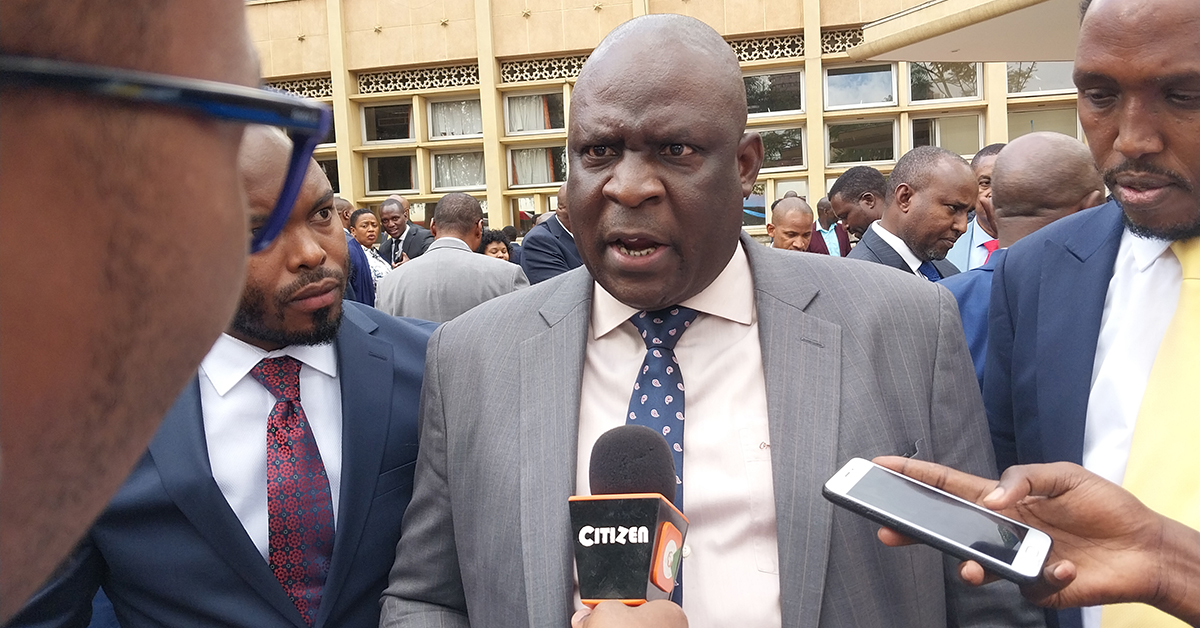Looming teachers' strike threatens to disrupt school reopening

Kuppet chairperson Omboko Milemba. File photo
A nationwide teachers' strike is expected to disrupt the reopening of schools across Kenya after two union groups issued similar demands to the employer.
On Friday, the Kenya National Union of Teachers (Knut) issued five demands to the Teachers Service Commission (TSC) threatening that if they are not met on time, it will have no otherwise, but paralyse learning starting the midnight of August 25, 2024.
Knut Secretary General Collins Oyuu, in a statement said that the union’s National Executive Council met on Friday having looked at “these grave matters of concern.”
Mr Oyuu said that when the union realized that TSC had given a wide berth their well intended employee-employer meeting twice, it had no otherwise but to lodge a labour complaint by writing to the Cabinet Secretary for Labour and Social Protection on August 14, 2024.
Knut is demanding for immediate implementation of the second phase of the 2021-2025 amended Collective Bargaining Agreement (CBA) signed between TSC and Knut, immediate remittance of the third-party deductions accrued to their respective organisations, immediate conversion of 46,000 Junior School (JSS) teachers to permanent and pensionable terms and employment of 20,000 new teachers.
Knut has also demanded for promotion of 130,000 stagnated teachers on various job grades, and immediate remittance of capitation to the Medical Insurere to allow service providers offer medical services to sick teachers and their families.
This comes a day after the Kenya Union of Post-Primary Education Teachers (Kuppet), issued the strike notice, demanding the full implementation of the 2021-2025 CBA.
Kuppet cited unmet commitments by the government as the reason for this industrial action, which could significantly impact the upcoming school term.
During a live interview on Citizen TV on Thursday, National Chairperson of Kuppet Omboko Milemba (Emuhaya MP) detailed the reasons behind the strike.
According to Mr Milemba, the teachers' unions were forced to take this drastic step after the government failed to honour the commitments made under the CBA.
"The genesis of this strike lies in the long journey of collective bargaining agreements," Mr Milemba explained.
He added that teachers have been calm, but now they have no option but to down their tools unless a miracle happens.
The strike notice was issued after a series of frustrations, including the introduction of the controversial housing levy by the government in 2023.
Mr Milemba recounted how he led teachers in negotiations with President William Ruto, ultimately securing an agreement that the teachers would only accept the levy if it was accompanied by a compensatory CBA.
Despite these negotiations, the teachers were only granted an 11 percent pay increase and harmonised house allowance, which fell short of the 30-70 percent increase they had sought.
The CBA's second phase, which was supposed to include additional salary hikes and benefits, has not been implemented, leading to widespread anger among teachers. Milemba pointed out that the teachers' medical cover was slashed from Sh20 billion to Sh11 billion, and a Sh10 billion allocation for the second phase of the salary increase was entirely removed during budget cuts.
Additionally, a Sh1 billion promotion fund was completely scrapped, leaving teachers with little choice but to strike.
Nabii Nabwera, a member of the education committee, emphasised the legal implications of the government's actions.
"We are not dealing with anything else but a court order," Mr Nabwera said, referring to a pending bill under the Public Finance Management Act.
“When there is a pending bill, it becomes the first challenge… that's the law.”
The strike is also driven by critical staffing issues in Junior Secondary Schools (JSS).
According to Kuppet, there is an urgent need to employ 46,000 teachers on permanent terms and confirm 20,000 intern teachers who are currently on temporary contracts. These demands are among the six issues listed in the strike notice issued to the Teachers Service Commission (TSC) last week.
Education expert Janet Ouko, who was also part of the Citizen TV panel, expressed deep concern about the future of education in Kenya.
"Education is threatened because it has to compete with roads and security for funding," Ms Ouko said.
"We are not going to allow a government that threatens education to the level that we are seeing now."
Ms Ouko's remarks reflect the growing frustration among parents and educators who feel that the government's priorities are misplaced.
"As parents of this country, we feel education is being threatened by your government," she said. She directly addressed this to President Ruto, questioning the administration's commitment to the education sector.
As the strike date approaches, the education sector faces uncertainty, with parents, teachers, and students anxiously waiting to see if the government will respond to the unions' demands.
The full implementation of the 2021-2025 CBA, the confirmation of JSS interns, and the employment of more teachers remain at the forefront of the teachers' grievances.
Whether the government will act in time to prevent the strike remains to be seen, but the rare unity among the teachers' unions signals that this is a battle they are prepared to fight.
Schools calendar for the new term is scheduled to commence on August 26, 2024.

Be the First to Comment